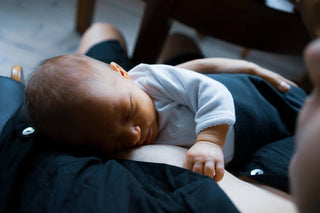Caring for your baby while feeling unwell can be challenging, and it’s natural to wonder, “Can I breastfeed while sick?” The good news is, in most cases, the answer is yes. Not only is breastfeeding while sick safe, but it can also help protect your baby by passing on antibodies that strengthen their immune system.
Let’s explore when it’s safe to breastfeed, how to care for yourself while recovering, and which medications are safe to take during this time.
Is It Safe to Breastfeed While Sick?
According to Unicef, for most common illnesses — including colds, the flu, or mild stomach bugs — it’s completely safe to continue breastfeeding. By the time you notice symptoms, your baby has likely already been exposed, and your milk is working to support their immune system.
However, if you have a more serious illness or are undergoing specific medical treatments, it’s always a good idea to consult your healthcare provider.
Will My Baby Get Sick If I Breastfeed While Ill?
Many mothers worry, “Will my baby get sick if I breastfeed while I’m unwell?” According to the Center for Disease Control and Protection (CDC), breastfeeding while sick is not only safe but beneficial. Your breast milk contains antibodies that help your baby fight off infections, reducing their risk of falling ill.
To minimise the chance of passing germs, practice good hygiene:
- Wash your hands frequently.
- Wear a mask while nursing if you’re coughing or sneezing.
- Avoid kissing your baby on the face until you recover.
When Breastfeeding May Not Be Safe
Here are some scenarios where breastfeeding might need to be paused or adjusted:
- HIV or Untreated Tuberculosis: If you have HIV, there’s a risk of transmitting the virus to your baby through breast milk. Similarly, untreated tuberculosis can pose a risk, as it’s highly contagious. Your healthcare provider can guide you on safe feeding alternatives, such as donor milk or formula, while ensuring you receive the necessary treatment.
- Active Herpes Sores on the Breast: If you have active herpes sores on your breast, it’s best to avoid breastfeeding from that side until the sores have healed. Herpes can be transmitted to your baby through direct contact, which could lead to serious complications. Pumping and discarding milk from the affected breast may be recommended until the infection clears.
- Chemotherapy or Radiation Therapy: If you’re undergoing chemotherapy or radiation therapy for cancer, these treatments can affect your milk supply and potentially pass harmful substances into your breast milk. Your healthcare team can help you explore safe feeding options and provide support during this challenging time.
Sick and Breastfeeding: What Medications Can I Take?
Not all medications are safe for breastfeeding mothers, so it’s important to check before taking anything. Here’s a quick guide:
Safe Medications
Many over-the-counter medications are considered safe while breastfeeding, including:
- Paracetamol (Panadol)
- Ibuprofen (Nurofen, Advil)
- Certain antihistamines like loratadine (Claritin)
- Antibiotics like amoxicillin and Augmentin
Natural Remedies for Symptom Relief
If you prefer natural options, try these breastfeeding-friendly remedies:
- Steam inhalation for nasal congestion.
- Honey and warm water to soothe a sore throat.
- Ginger tea to ease nausea.
How to Take Care of Yourself While Breastfeeding and Sick
When you’re unwell, your body needs extra care to recover while maintaining your milk supply. Here are some tips to help you feel better faster:
Stay Hydrated
Fever, vomiting, or diarrhoea can lead to dehydration, so drinking plenty of fluids is important. Aim for at least 8-10 glasses of water daily to stay hydrated and steady your milk production.
Eat Nutrient-Dense Foods
Even if your appetite is low, try to nourish your body with foods that provide energy and essential nutrients. Soups, smoothies, and whole grains are easy-to-digest options supporting your recovery.
Rest as Much as Possible
We know resting with a baby isn’t easy, but it’s crucial for recovery. Ask for help from your partner, family, or friends so you can get extra sleep. Even short naps can make a big difference.
You’re Not Alone: Breastfeeding Through Illness Is Manageable

Being sick while caring for a baby is undeniably tough, but in most cases, you can continue breastfeeding without worry. Your milk nourishes your baby and provides essential antibodies that help protect them. By caring for yourself — staying hydrated, resting, and seeking support — you’ll recover more quickly and continue to provide for your little one.
If you have concerns about your health, milk supply, or medications, Flegen’s online lactation consultants are here to help. From answering postpartum questions to offering expert breastfeeding guidance, we’re committed to supporting you every step of the way. Reach out to us today — you’re never alone in this journey.


